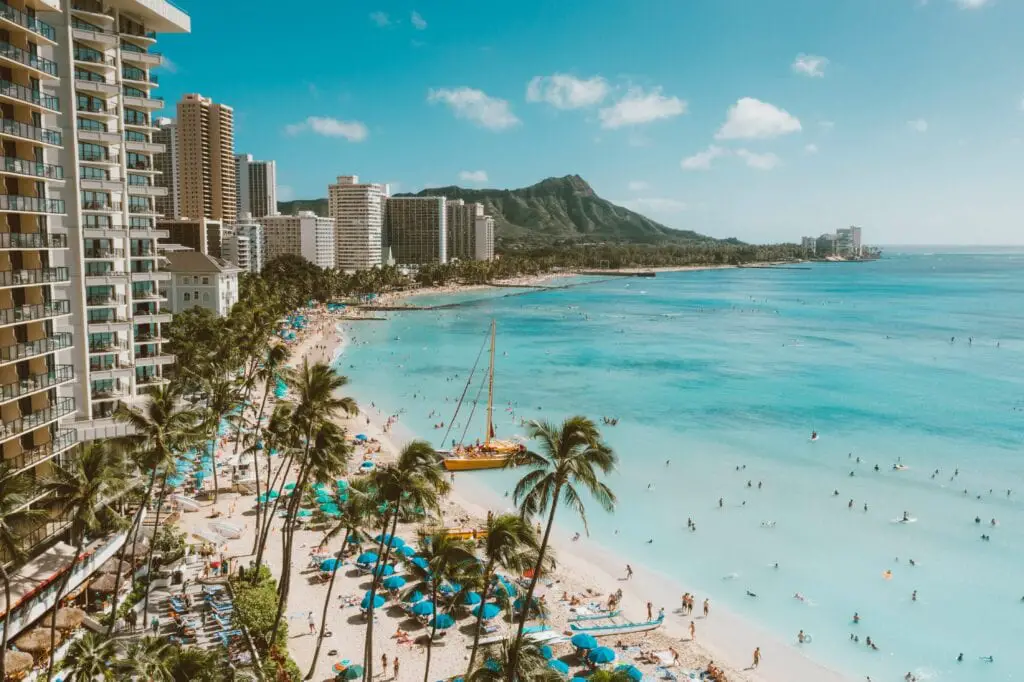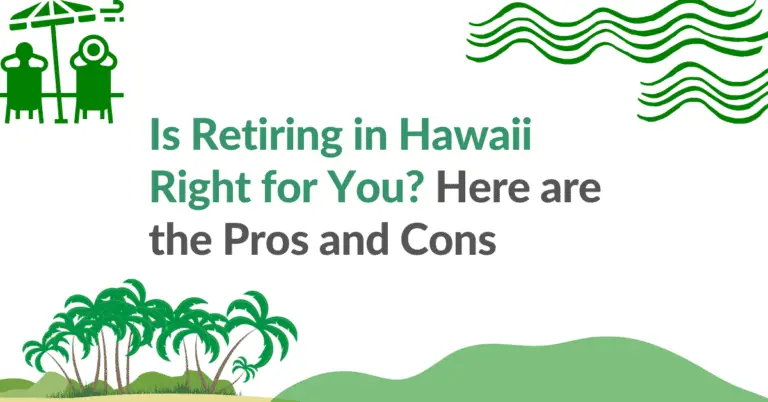So you’re thinking of leaving the big smoke and retiring to the island paradise that is Hawaii? Are you hooked on the idea of ‘island time’ and a relaxed, sunshiney lifestyle? Hawaii has a relaxed atmosphere, gorgeous natural surroundings, and good weather in spades – but island life isn’t for everyone.
We take a look at the pros and cons of retiring to the Aloha state so you can better determine whether the move is the right one for you, your family, and your lifestyle.
Pros
Pro: Accessible and Quality Healthcare
A priority for many retirees is having quality healthcare services that they can access without too much effort. Hawaii has an excellent healthcare system. The state is ranked highly for both quality and access to healthcare amongst the US states, which means you can have peace of mind that your healthcare needs can be well taken care of in retirement.
Living near the beach is believed to be hugely beneficial in improving mental and physical well-being. Sea air has been scientifically linked to promoting better sleep and saltwater has healing properties in addition to being good for the skin. Just being present in Hawaii, breathing in the ocean air, and swimming in the ocean frequently might have a huge impact on your health. With these kinds of benefits, is it any wonder that Hawaii is such a desirable place to retire?
The life expectancy of people in Hawaii is the highest in the United States! Many attribute this not just to the quality and accessible healthcare available but also to the Hawaiian way of life. Many people living in Hawaii may not need healthcare services as frequently due to the community’s focus on a stress-reduced lifestyle and enjoying all that Hawaii’s natural habitat has to offer through a range of outdoor activities.

Pro: Healthy Living
Living the Aloha lifestyle means locals build in time each day to slow down and unwind, as well as focus on quality time with family and friends. Living life at a slower pace and focusing on what matters mean that Hawaiians are less stressed than the average American. Reduced stress leads to better mental and physical health, so you may find that leaving a faster-paced lifestyle behind can have a profound impact on your overall well-being.
Getting outdoors and making the most of the islands’ beauty is an integral part of living in Hawaii. There are a wealth of outdoor activities available, no matter your fitness level, abilities, or interests. Walking, surfing, hiking, snorkeling, or stand-up paddle boarding – Hawaii has it all. There is certainly no shortage of adventures to be had on the islands, so there’s no reason to be bored in retirement!
Exploring the wealth of natural beauty the islands have to offer will have you more active than ever before while allowing you to take in the fantastic scenery that draws so many people to Hawaii’s shores each year.
Pro: Temperate Climate and Weather
While the weather isn’t always sunny and perfect in Hawaii – it almost always is! It’s no secret that Hawaii has a beautifully temperate climate year-round, with no harsh winter temperatures to be found. Throughout the islands, the temperatures are fairly consistent year-round.
While winter is the rainy season in Hawaii, the weather is very localized, which means it’s usually fairly simple to avoid bad weather by driving around the coast to a spot where the weather is clear. This means plans in the outdoors rarely need to be canceled due to the weather, you can just head to a different spot to enjoy the same fair-weather activity you had planned.
Pro: Tax Advantages for Certain Types of Pensions
Of course, financial matters are high on the list of considerations for every retiree. Knowing what type of lifestyle you will be able to afford in Hawaii is important and taxes can play a large role in the funds available for your retirement. If you’re planning to fund your retirement wholly or partly through Social Security retirement benefits or public pension income, you’re in luck! These types of retirement income are completely untaxed in Hawaii.
Pro: Low Crime Rate
Peace of mind regarding safety is an essential element of retiring well as it allows you to relax in your environment and enjoy life to the fullest, once the daily stresses of work are behind you. Safety-conscious retirees will be pleased to know that the crime rate in Hawaii is very low and is consistently well below the national average rate. So you and your family can relax knowing the islands are a safe place to live.
Pro: Art, Culture, and History abound
In addition to the many outdoor activities Hawaii has to offer, it also has plenty of cultural and historical sites to explore. There are several cultural centers and experiences in Hawaii that will allow you to learn more about the native Hawaiian culture and history. Although this may seem like a touristy thing to do, understanding and appreciating native Hawaiian culture is an important part of living on the islands and a worthwhile experience.
If you’re into art, you can enjoy a mix of traditional and contemporary art at the various galleries and museums across the islands. Like many islands and beachside towns, Hawaii is a creative hub for artists and musicians to live and work. Live music is an important part of Hawaiian culture. What better way to immerse yourself in a new culture and community than through the local art and music and sharing these experiences with others?
Cons
Con: Distance from Family and Friends
One element of retiring in Hawaii that could have a major impact on your daily life is the distance from family and friends. If your inner circle has already made the move to the island paradise, then feel free to skip this section! But for those of us with family and friends living in the mainland United States or elsewhere in the world, moving far away from your social circle is an important consideration.
With the shortest flight to the US mainland being 5.5 hours, it’s no small feat to journey back to see family and friends, especially if they live on the east coast. You might need to think about how holidays will work; will your family rotate flying out to visit you?
Or will you need to make your way to them for each get-together? Importantly, do you have the financial means to support multiple trips to visit family and friends each year, or will those trips impact the type of lifestyle you can afford in Hawaii?
Although you may be able to travel and visit family and friends, living in Hawaii and away from your social circle is likely to impact your daily life and social activities. You will likely see your friends and grandkids less than if you remained living nearby. It’s all about priorities and what kind of lifestyle you see yourself living each day in retirement.
Con: High Cost of living
One serious con is the incredibly high cost of living in Hawaii. Real estate and housing are the most expensive in the country and necessities such as groceries, medicine, and other household items can cost significantly more than on the US mainland. The need for everything to be imported to the islands means that prices are high and in some cases, simple products are difficult or impossible to obtain.
The cost of living in Hawaii has caused many locals to leave Hawaii in recent years as the prices of housing and necessities have climbed higher. Be sure to do your research and ensure that living in Hawaii will be financially feasible in the long term. It can cost a lot of money to arrange an overseas move, so make sure you can sustain the high price of the island life and enjoy your retirement without money worries.

Con: Lack of Public Transport
We are all likely to hang up our car keys and stop driving at some point in our old age, so it’s important as retirees to consider how you will be able to get around when you cannot or will not drive any longer. Unfortunately, Hawaii’s public transport system is sparse and does not cover all of the islands. The only method of public transport available is bus travel and busses are only available in Oahu, Maui, Kauai, and Hawaii counties. This leaves much of the islands without access to public transport, which can make it difficult to get around if you don’t drive a car.
Your best bet is to plan for the lack of public transport available. Look to purchase your home in Hawaii in an area near public transport or where many amenities are within a walkable distance. If you are fit and active, you may wish to purchase a bike – this could be an excellent way to get your daily exercise in, explore Hawaii’s natural scenery, and get around town without a vehicle. If you have friends and family in Hawaii who can drive you around, the lack of public transport may not be an issue for you. Of course, there is always the option to use taxis or rideshare apps to get around.
Con: Tax Disadvantages for Private Pensions
Aside from public pension income, which is entirely tax-exempt, any other kind of retirement income is fully taxed in Hawaii. So if you are planning to retire on a private pension, you will need to take into consideration the taxes that will be levied on that income by the state, should you move to Hawaii. Your money may go further in another state that has reduced taxes for private retirement incomes.
Con: the Vog
While it’s mostly blue skies and smooth sailing when it comes to Hawaii’s weather, there is one unique weather occurrence that you should be aware of before moving to Hawaii. Volcanic Fog, which the locals call ‘vog’ is a product of gases from the Halema’uma’u Crater mixing with moisture and sunlight in the air. This causes a hazy, foggy effect in the air over the islands. Unfortunately, when the volcano is active and under extreme conditions, the vog can be dangerous to humans.
Many Hawaiian residents report headaches or trouble breathing when the vog is very thick. The locals usually deal with it by simply avoiding strenuous outdoor activities during periods where the vog is heavy. If you have any respiratory conditions, it may be worthwhile investigating the Hawaiian vog and its possible impacts on your health.
Con: Island Fever
Although Hawaii is far from a deserted island with one lone shipwreck survivor, you may still experience island fever. Island fever is a term that refers to the psychological phenomenon where people living on an island experience a claustrophobic feeling, as though the island is too small and they are disconnected from the outside world. Island fever can manifest as feelings of claustrophobia, anxiousness, and irritability.
Although it has a sizeable population, Hawaii is a small cluster of islands in the Pacific Ocean that is 2,400 miles away from the closest land mass. Because of this, Hawaii is more geographically isolated than any other population center on the planet. Being on an island and surrounded by water for months or years on end can cause some people to experience island fever. No matter how developed Hawaii is or how globally connected the world is today, this phenomenon still impacts locals and visitors alike.
Final Thoughts
Hawaii certainly has a lot to offer retirees in terms of lifestyle, activities, and culture. Of course, no retirement location is perfect. Living in Hawaii does have its drawbacks, but many retirees find these tolerable considering all of the health and lifestyle benefits of the Aloha state. It’s all about weighing up your priorities and the lifestyle you desire in retirement and working out whether Hawaii is the right fit for you. You might find that the pros well outweigh the cons!

